New
Showing all 10 results
Books that have been recently published by BYU Studies.
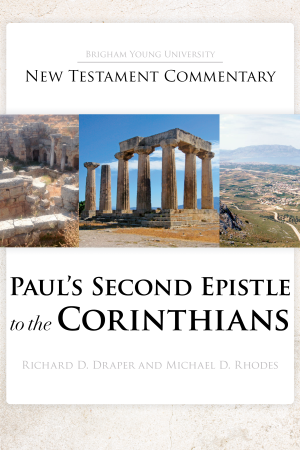
BYU New Testament Commentary: Paul’s Second Epistle to the Corinthians
Read sample pages.
Paul’s second epistle to the Corinthians, like his first, will resonate with most Latter-day Saints. Paul’s battle remains remarkably relevant today because conditions and attitudes found in ancient Corinth have reemerged in the postmodern Western world. The Corinthian microcosm was largely skeptical, materialistic, pluralistic, and immoral and as such, its standards were contrary to those of the Christian community. This epistle reveals the countercultural nature of Christianity. The Apostle promotes a practical religion that translates into everyday actions and conduct both in his time and in ours. He stresses the importance of forgiving others, being hopeful and encouraging in trying circumstances, recognizing that affliction for the kingdom’s sake is the Church’s true glory, and being glad to suffer for God’s cause. He notes the need to walk by faith and not by sight while the Christians suffer through mortality. He also encourages the Saints to be anxiously engaged. He cautions Church members about being overly eager to defend themselves against those who attack them but also insists that there are times when a strong defense is called for, especially when the integrity of the gospel has been challenged.
This book is the most comprehensive study of Second Corinthains that LDS scholars have yet produced. It relies on the LDS canon of scripture and teachings of LDS prophets alongside rigorous biblical scholarship and Paul’s original Greek.
Because this commentary relies heavily on the Greek text, it is presented along with the King James Version. It also presents a new English rendering of the Greek text designed to make Paul’s message more understandable to the modern reader. This rendition is set side by side with the King James text for easy comparison. The commentary contains translation notes and helpful historical and cultural background. The work strives to be as up to date as possible.
Through examining every verse in Second Corinthians, the rich theology of the Atonement, the Resurrection, the need for reconciliation between child and Father, to assist others, and to follow legitimate leaders all come alive. Those who read this volume will find in it faith, hope, and understanding of key principles and doctrines. The text bears a strong witness to the Lord Jesus Christ and a clear elucidation of his gospel as articulated by the Apostle Paul.

BYU New Testament Commentary: The Epistle to the Ephesians
Read sample pages.
Tucked into the New Testament after Galatians and the Corinthian correspondence, the Epistle to the Ephesians casts a warm, quieting glow when compared to the strident character of Galatians and the rather tough lines that Paul penned to former associates in Corinth. In Ephesians, by contrast, the Apostle Paul has shined a bright light on both an overly generous God the Father, who “is able to do exceeding abundantly above all that we ask or think” (Eph. 3:20), and the Gentiles whom he has recently welcomed into the celestial fold, making them “no more strangers and foreigners, but fellowcitizens with the saints, and of the household of God” (2:19). But there is much more, for the letter opens on the scene of the premortal council and ends with church members clothed in God’s sacred, protective armor that helps them “to stand against the wiles of the devil,” an indicator of the looming apostasy (6:11). In addition, enfolded within Ephesians is a tightly woven strand of family-centered interests, including an expectation of eternal families, pointers to sacred rituals, and the joyous assurance to believers that Christ “hath raised us up together, and made us sit together in heavenly places in Christ Jesus” (2:6). This exalted position is made possible because of one of the grandest gifts that comes from the Father through the Son— “redemption through his blood, the forgiveness of sins” (2:7). Hallelujah!

Relational Faith: The Transformation and Restoration of Pistis as Knowledge, Trust, Confidence, and Covenantal Faithfulness
Faith is a precious doctrine of the gospel of Jesus Christ. Ancient prophets and apostles clearly taught that faith is relational: faith is trust, loyalty, obedience, and devotion to God and his Son, and it encompasses God’s blessings to us. In the language and culture of ancient Greece, pistis (faith) meant faithfulness and trust, and when New Testament writers taught about faith, their ancient readers understood its relational nuances.
An apostasy regarding the meaning and doctrine of faith occurred, and the word faith came to have many varied meanings. Some theologians have taught that faith is a passive belief in a creed or a statement of belief in God that would guarantee one’s salvation. Theologians such as Augustine, Aquinas, Wyclif, Hus, Luther, Calvin, and Bultmann went off course in their understanding of faith.
The restoration of the gospel that came through Joseph Smith and living prophets has revived the correct understanding of faith as a reciprocal relationship between people and God. For Latter-day Saints, faith is a principle of action, knowledge, understanding, trust, obedience, and faithfulness. Faith once again motivates disciples to trust in Jesus Christ, repent, and follow his straight and narrow covenant path leading to salvation and exaltation.
Review of Relational Faith by Jeff Lindsay at his website "Arise from the Dust"
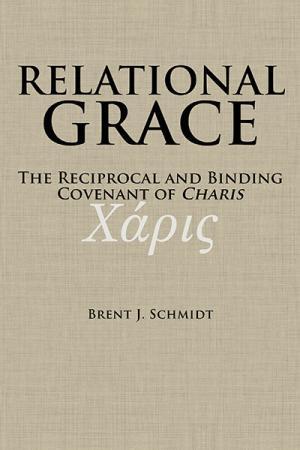
Relational Grace: The Reciprocal and Binding Covenant of Charis
*Note: we are doing a limited reprint of this book. You may still make orders but they will take several weeks to ship.
In ancient Greece and Rome, charis was a system in which one person gave something of value to another, and the receiver gave service, thanks, and lesser value back to the giver. It was the word used to describe familial gifts, gifts between friends, gifts between kings and servants, and gifts to and from the gods. In Rome, these reciprocal transactions became the patron-client system. Orderly gift exchange is a key building block in the development of societies.
Charis (grace) is the word New Testament authors, especially Paul, sometimes used to explain Christ’s gift to people. But what is the nature of the gift? Since the fifth century, a number of Christian scholars have taught that grace is something bestowed by God freely, with little or nothing required in return. This book sets out to show that “free grace” is not what Paul and others intended.
The practice in the ancient world of people granting and receiving favors and gifts came with clear obligations. Charis served New Testament authors as a model for God’s mercy through the atonement of Jesus Christ, which also comes with covenantal obligations.
LDS scriptures make it clear that being saved comes through grace accompanied by forsaking sin and making and keeping covenants. For Latter-day Saints, being saved by grace means coming to Christ, being baptized and joining the community of saints, and continually living with thanks and praise for God’s gift. All of these expressions of grace are found both in the Greek and Pauline use of the word. Knowing what charis means helps us understand what God expects us to do once we have accepted his grace.
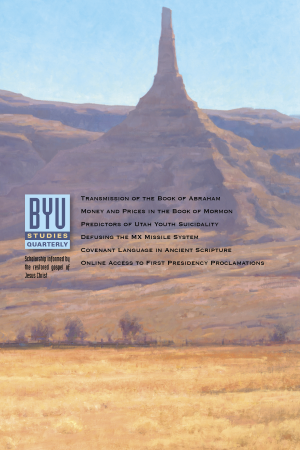
Volume 61:2 (2022) Print
This issue begins by paying tribute to former Senator Orrin G. Hatch, who passed away on April 23, 2022. Shinji Takagi examines the monetary system in the Book of Mormon from the perspective on an economist. Conservationist Paul Alan Cox gives readers a background to the MX missile project proposed for Utah and Nevada in the 1980s, which The Church of Jesus Christ of Latter-day Saints opposed in an official statement. Researchers W. Justin Dyer, Michael A. Goodman, and David S. Wood surveyed more than 86,000 participants in grades 6, 8, 10, and 12 in an attempt to identify predictors of suicidality in Utah youth, paying special attention to the impact of religion on those who identify as lesbian, gay, bisexual, or questioning. Stephen O. Smoot and Kerry Muhlestein theorize how the Book of Abraham could have been transmitted from his time into the Ptolemaic period, a journey of well over a millennium and a half. Noel B. Reynolds explores covenant language found in the Book of Mormon as compared to the language of other ancient books of scripture in the canon of the Church of Jesus Christ.
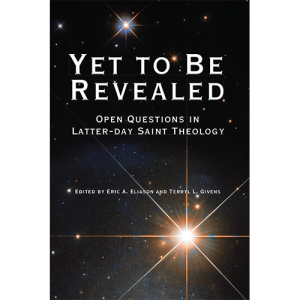
Yet to Be Revealed: Open Questions in Latter-day Saint Theology
An important part of discipleship is knowing what questions to ask—and which ones have not yet been adequately answered. From the beginning to recent times, prophets have reminded the Saints that the Restoration is ongoing, not an event. Our purpose in assembling this collection of essays is simple: we wish to celebrate the miracle of continuing revelation, and the promise of more to come, that God will “yet reveal many great and important things.” This means that the essays selected for inclusion represent only a few of the hundreds of possible subjects.
Ours is an effort to clarify some of the hazy borders of orthodoxy and to honor the dynamism, the richness, and the possibilities of a Restoration still very much in process of unfolding. Joseph Smith taught, “By proving contraries truth is manifest.” A fuller understanding of truth can come by keeping multiple perspectives in mind and letting them work themselves out in patience and God’s own time, like fruitful leaven.
Topics include:
- What is the nature of God’s progress?
- Where did Book of Mormon events take place?
- What is women’s relationship to priesthood?
- Is God subject to or the creator of eternal law?
- Will things get better or worse before the Second Coming?
- Was Jesus married?
- Is the Song of Solomon scripture?
- How was the Book of Mormon translated?
“We as Latter-day Saints have too often felt sure about things the prophets haven’t actually decided, and about things God seems to have left open for us to reflect on humbly. This breathtakingly honest collection of essays does excellent work to make clear just how much we in fact don’t know. That there’s so much to learn is wonderful news, however. We’ll have to bring all of our minds, and not just all of our hearts, to the task of being earnest disciples.”
—Joseph Spencer, author of 1st Nephi: A Brief Theological Introduction
“This much-needed engagement with . . . interesting theological questions is long overdue.”
—Blake T. Ostler, Esq., author of the four-volume Exploring Mormon Thought book series on Latter-day Saint theology
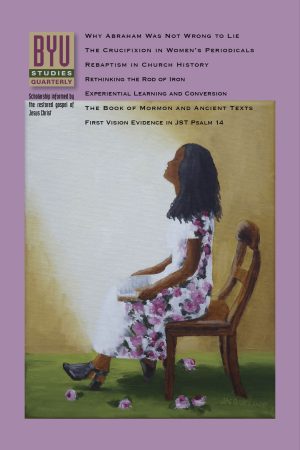
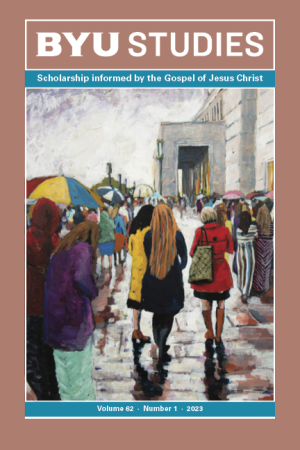
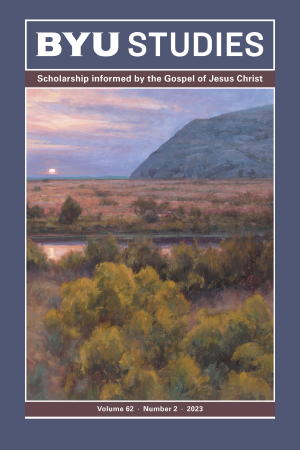


BYU New Testament Commentary: Essential Tools for Understanding the New Testament